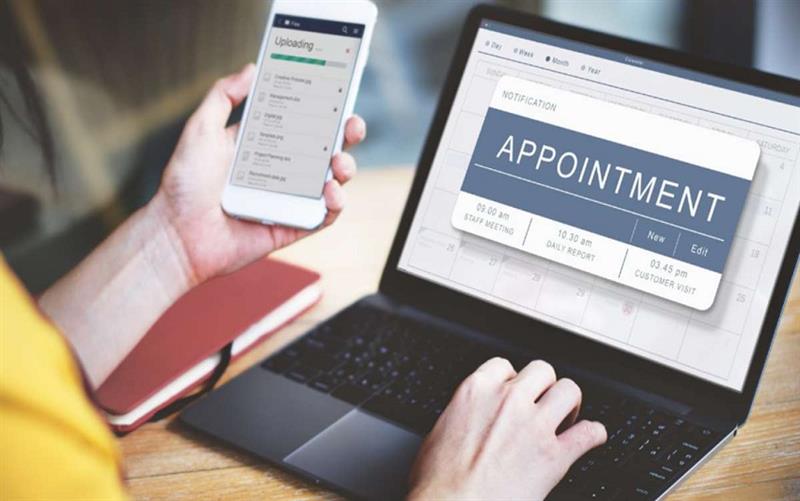
Software for scheduling patient appointments is now essential for all contemporary medical practices. This program changes the way healthcare practitioners work by decreasing administrative burden and no-shows, enhancing patient involvement, and boosting income.
Medical practices can improve patient experiences
Maximize staff productivity
Lower operating expenses
Increase income by investing in an effective automated scheduling system.
Effective scheduling is essential for delivering high-quality patient care and maximizing practice management in the hectic healthcare industry of today. Conventional techniques, including manual phone scheduling or paper-based booking, frequently result in long wait times, missed appointments, and administrative inefficiencies.
Patient appointment scheduling software is a game-changer for medical practices in this situation. This program guarantees a better patient experience, fewer no-shows, and more staff efficiency by automating and optimizing the booking process.
Let's examine the main justifications for why patient appointment scheduling software ought to be used by all medical practices right now.
1. Streamlines Appointment Booking and Reduces Administrative Work
Manual scheduling takes a lot of time and is prone to mistakes made by people. The entire procedure is made simpler by automated appointment scheduling software, which:
Enabling online appointment scheduling for patients at any time and from any location
Offering real-time availability updates to prevent duplicate reservations
Reducing the number of phone calls that reception staff must answer.
Having scheduling software allows your administrative staff to concentrate on other important duties, including helping with patient care.
2. Reduces No-Shows with Automated Reminders
Workflow disruption and lost revenue are two consequences of missed appointments. Software for scheduling reduces no-shows by:
Providing patients with automatic phone, email, or SMS reminders prior to their appointments
Providing a simple way to reschedule in the event of a conflict
Letting practices monitor patient attendance patterns and take appropriate action
Healthcare facilities may preserve productivity and enhance cash flow by making sure patients remember and show up for their appointments.
3. Improves Patient Experience and Convenience
Patients today anticipate simple access to healthcare through digital technologies. Software for scheduling appointments improves patient satisfaction by:
Making self-service appointment scheduling possible with short wait times
Improving scheduling accuracy to lessen waiting room congestion
Providing real-time confirmation and booking status updates
Patients are more likely to stick with your practice and refer others if the booking process is easy to use.
4. Enhances Practice Efficiency and Productivity
Medical personnel can concentrate on patient care rather than paperwork when scheduling is automated. Workflows are optimized by the program by:
Enabling staff to monitor and modify the schedule in real time
Integrating with Electronic Health Records (EHR) systems for smooth patient care
Effectively allocating time slots to prevent overbooking or lengthy gaps
Appointment scheduling software facilitates the seamless and effective operation of medical practices by enhancing overall workflow.
5. Offers Secure and Centralized Patient Data Management
Manually scheduling patient appointments raises the possibility of misplaced or lost records. Software for arranging appointments guarantees:
Secure appointment data storage with encrypted data security
Centralized access to patient booking history and preferences
Integration with billing systems for seamless payment processing.
Medical practitioners can access real-time patient data from any location at any time with secure, cloud-based scheduling.
6. Provides Insights with Analytics and Reporting
Any expanding medical practice must make decisions based on data. Scheduling software offers useful information like:
Frequency of patient visits, which enables practitioners to customize follow-ups and care plans
Peak appointment hours, which aid clinics in efficiently managing staff schedules
Trends in cancellations, which aid in modifying strategies to lessen income loss.
Medical offices can improve patient care and streamline operations with the help of comprehensive reporting and analytics.
7. Enables Telehealth and Remote Consultations
Appointment scheduling software has made it easier for patients to schedule virtual consultations as telemedicine has grown. It assists by:
Easily integrating with platforms for video conferences
Enabling physicians to make both virtual and in-person appointments using a single system
Sending telehealth session reminders and secure connections
Even if patients are unable to attend in person, this guarantees that they receive prompt care.
8. Improves Patient Retention and Engagement
Strong patient relationships are essential to the success of medical practices. Software for arranging appointments keeps patients interested by:
Personalized follow-up and yearly check-up reminders are sent out
Quick rescheduling alternatives are offered to avoid missed appointments
A patient portal is made available for quick access to the patient's medical history and forthcoming appointments
Long-term patient loyalty can be developed by practices through better communication and accessibility.
9. Saves Costs and Increases Revenue
Overstaffing, missed appointments, and no-shows result in financial losses as a result of ineffective scheduling. Software for scheduling lowers expenses by:
Offering prepaid appointment alternatives, securing revenue in advance
Automating invoicing and insurance verification, minimizing administrative burden
Optimizing appointment slots, guaranteeing higher patient turnover.
Medical practices improve patient care and boost profitability by making the most of their time and resources.
10. Ensures Compliance with Healthcare Regulations
Strict scheduling paperwork is necessary for regulatory compliance in many healthcare industries. Software for arranging appointments guarantees:
Data security that complies with HIPAA, safeguarding patient information
Precise documentation, preventing scheduling conflicts or mistakes
Reports that are audit-ready, streamlining insurance and legal needs
Practices may function confidently and steer clear of possible legal problems with integrated compliance procedures.